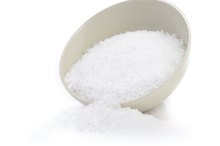What does fact checked mean?
At Healthfully, we strive to deliver objective content that is accurate and up-to-date. Our team periodically reviews articles in order to ensure content quality. The sources cited below consist of evidence from peer-reviewed journals, prominent medical organizations, academic associations, and government data.
The information contained on this site is for informational purposes only, and should not be used as a substitute for the advice of a professional health care provider. Please check with the appropriate physician regarding health questions and concerns. Although we strive to deliver accurate and up-to-date information, no guarantee to that effect is made.
Low Blood Pressure & Craving Salt
A mild craving for salt is normal, but if you find yourself having strong or recurring salt cravings along with low blood pressure, it may be a sign of a serious underlying problem with your adrenal glands. Your doctor can help determine if your salt craving and blood pressure numbers are harmless or a result of a major medical condition.
Salt Craving and Sodium
Sodium is a substance that is found in your blood and is important for your health because it is an electrolyte. Your body tries to keep your sodium levels within a fairly narrow range. If you develop a severe craving for salt, it can be a sign that your sodium levels are low. If you have a craving for salt along with low blood pressure, this may be a sign of a problem with your adrenal glands.
- Sodium is a substance that is found in your blood and is important for your health because it is an electrolyte.
- If you develop a severe craving for salt, it can be a sign that your sodium levels are low.
Adrenal Glands and Sodium Regulation
Why Do I Always Crave Water & Salt?
Learn More
Your adrenal glands make a variety of hormones that regulate different processes in your body. One adrenal hormone, aldosterone, is a mineralcorticoid, which means that it helps control the levels of sodium and potassium in your blood. Addison's disease occurs when the adrenal glands are not able to make enough of these different hormones 1. The resulting aldosterone deficiency can cause a loss of fluid and salt from the body, leading to a salt craving and low blood pressure.
- Your adrenal glands make a variety of hormones that regulate different processes in your body.
- One adrenal hormone, aldosterone, is a mineralcorticoid, which means that it helps control the levels of sodium and potassium in your blood.
Symptoms
Addison's disease can manifest in a variety of ways 1. In addition to craving salt, people with Addison's disease may feel constantly thirsty or dizzy 1. Chronic vomiting and diarrhea can result in dehydration. Addison's can also cause:
- muscle weakness
- fatigue
- paleness
- loss of appetite
- lesions in the mouth
- darkened skin patches
- unintended weight loss
- unusually sluggish movement
Causes and Treatment
Relationship Between Salt & Dehydration in the Human Body
Learn More
In most cases, Addison's is caused when the immune system attacks the adrenal gland and impedes its ability to make hormones. However, some infections such as cytomegalovirus and tuberculosis can cause Addison's disease 1. Shock can also cause Addison's as a result of hemorrhage in the adrenal glands. If your salt craving and low blood pressure is due to a lack of aldosterone, your doctor will probably treat you with aldosterone supplements.
- In most cases, Addison's is caused when the immune system attacks the adrenal gland and impedes its ability to make hormones.
Related Articles
References
- Medline Plus: Addison's Disease
- Addison disease: MedlinePlus Medical Encyclopedia. MedlinePlus. Nov 6, 2019.
- Munir S, Waseem M. Addison Disease. Treasure Island, Fl: StatPearls Publishing; 2019.
- Symptoms and Causes. National Institute of Diabetes and Digestive and Kidney Diseases. Sept 1, 2018.
- Hahner S, Spinnler C, Fassnacht M, et al. High incidence of adrenal crisis in educated patients with chronic adrenal insufficiency: a prospective study. J Clin Endocrinol Metab. 2015;100(2):407-16. doi:10.1210/jc.2014-3191
- Hahner S, Loeffler M, Bleicken B, et al. Epidemiology of adrenal crisis in chronic adrenal insufficiency: the need for new prevention strategies. Eur J Endocrinol. 2010;162(3):597-602. doi:10.1530/EJE-09-0884
- Puar TH, Stikkelbroeck NM, Smans LC, Zelissen PM, Hermus AR. Adrenal Crisis: Still a Deadly Event in the 21st Century. Am J Med. 2016;129(3):339.e1-9. doi:10.1016/j.amjmed.2015.08.021
- Morin C, Fardet L. Systemic glucocorticoid therapy: risk factors for reported adverse events and beliefs about the drug. A cross-sectional online survey of 820 patients. Clin Rheumatol. 2015;34(12):2119-26. doi:10.1007/s10067-015-2953-7
- Elshimy G, Alghoula F, Jeong JM. Adrenal Crisis. Treasure Island, Fl: StatPearls Publishing; 2019.
- Oliveira D, Lages A, Paiva S, Carrilho F. Treatment of Addison's disease during pregnancy. Endocrinol Diabetes Metab Case Rep. 2018;2018 doi:10.1530/EDM-17-0179
- Johannsson G, Falorni A, Skrtic S, et al. Adrenal insufficiency: review of clinical outcomes with current glucocorticoid replacement therapy. Clin Endocrinol (Oxf). 2015;82(1):2-11. doi:10.1111/cen.12603
- Hahner S, Loeffler M, Bleicken B, et al. Epidemiology of adrenal crisis in chronic adrenal insufficiency: the need for new prevention strategies. Eur J Endocrinol. 2010;162(3):597-602. doi:10.1530/EJE-09-0884.
- Hahner S, Spinnler C, Fassnacht M, et al. High incidence of adrenal crisis in educated patients with chronic adrenal insufficiency: a prospective study. J Clin Endocrinol Metab. 2015;100(2):407-16. doi:10.1201/jc.2014-3191.
- Johannsson G, Falomi A, Skrtic S, et al. Adrenal insufficiency: review of clinical outcomes with current glucocorticoid replacement therapy. Clin Endocrinol. 2015;82(1):2-11. doi:10.1111/cen.12603.
- Michel S, Michels N. Addison’s Disease: Early Detection and Treatment Principles. Amer Fam Phys. 2014;1;89(7):563-568.
- Puar T, Stikkelbroek N, Smans C, et al. Adrenal crisis: Still a deadly event in the 21st century. Amer J Med. 2016; 129(339):e1-9. doi:10.1016/j.amjmed.2015.08.021.
Writer Bio
Adam Cloe has been published in various scientific journals, including the "Journal of Biochemistry." He is currently a pathology resident at the University of Chicago. Cloe holds a Bachelor of Arts in biochemistry from Boston University, a M.D. from the University of Chicago and a Ph.D. in pathology from the University of Chicago.









